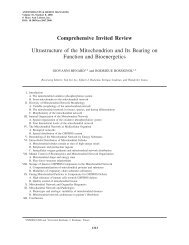MiPsummer Programme pdf - Mitochondrial Physiology Society
MiPsummer Programme pdf - Mitochondrial Physiology Society
MiPsummer Programme pdf - Mitochondrial Physiology Society
Create successful ePaper yourself
Turn your PDF publications into a flip-book with our unique Google optimized e-Paper software.
37<br />
Abstract # 10<br />
Overexpression of the mitochondrial deacetylase SIRT3 in liver has no effect on metabolic<br />
parameters in mice fed a high fat diet, despite increased oxygen consumption in isolated<br />
hepatocytes<br />
B. Osborne, M. Montgomery, G.J. Cooney, N.Turner<br />
Diabetes & Obesity Program, Garvan Institute of Medical Research, Darlinghurst, NSW 2012,<br />
Australia<br />
Background SIRT3, is a member of the sirtuin family of NAD + -dependent deacylases and the main<br />
mitochondrial deacetylase. SIRT3 has been shown to directly regulate a range of mitochondrial<br />
proteins, suggesting a key role for this enzyme in energy metabolism. Studies in SIRT3 knockout<br />
mice and high fat diet (HFD) fed mice have suggested a link between deleted or low SIRT3 protein<br />
and detrimental metabolic outcomes, including accelerated development of metabolic syndrome 1<br />
and fatty-acid oxidation disorders 2 .<br />
Objectives Given the detrimental effects of SIRT3 deletion, the aim of this study was to determine<br />
if hepatic overexpression of SIRT3 could protect against metabolic defects induced by excess lipid<br />
in mice.<br />
Methods C57BL6 mice were subjected to hydrodynamic tail vein injection of a plasmid containing<br />
SIRT3-FLAG to produce liver-specific overexpression. Primary hepatocytes were isolated and<br />
assessed for oxygen consumption (Seahorse XF Analyzer), triglyceride accumulation, and insulinstimulated<br />
glycogen synthesis, with or without overnight fatty acid treatment. Mice with liver<br />
overexpression of SIRT3 were also maintained on either a chow or high fat diet (HFD) and glucose<br />
tolerance, adiposity and liver triglyceride accumulation were assessed.<br />
Results SIRT3 was effectively overexpressed at both the mRNA and protein level in liver. Isolated<br />
hepatocytes overexpressing SIRT3 showed significantly increased basal oxygen consumption over<br />
controls (>50 percent increase, p



